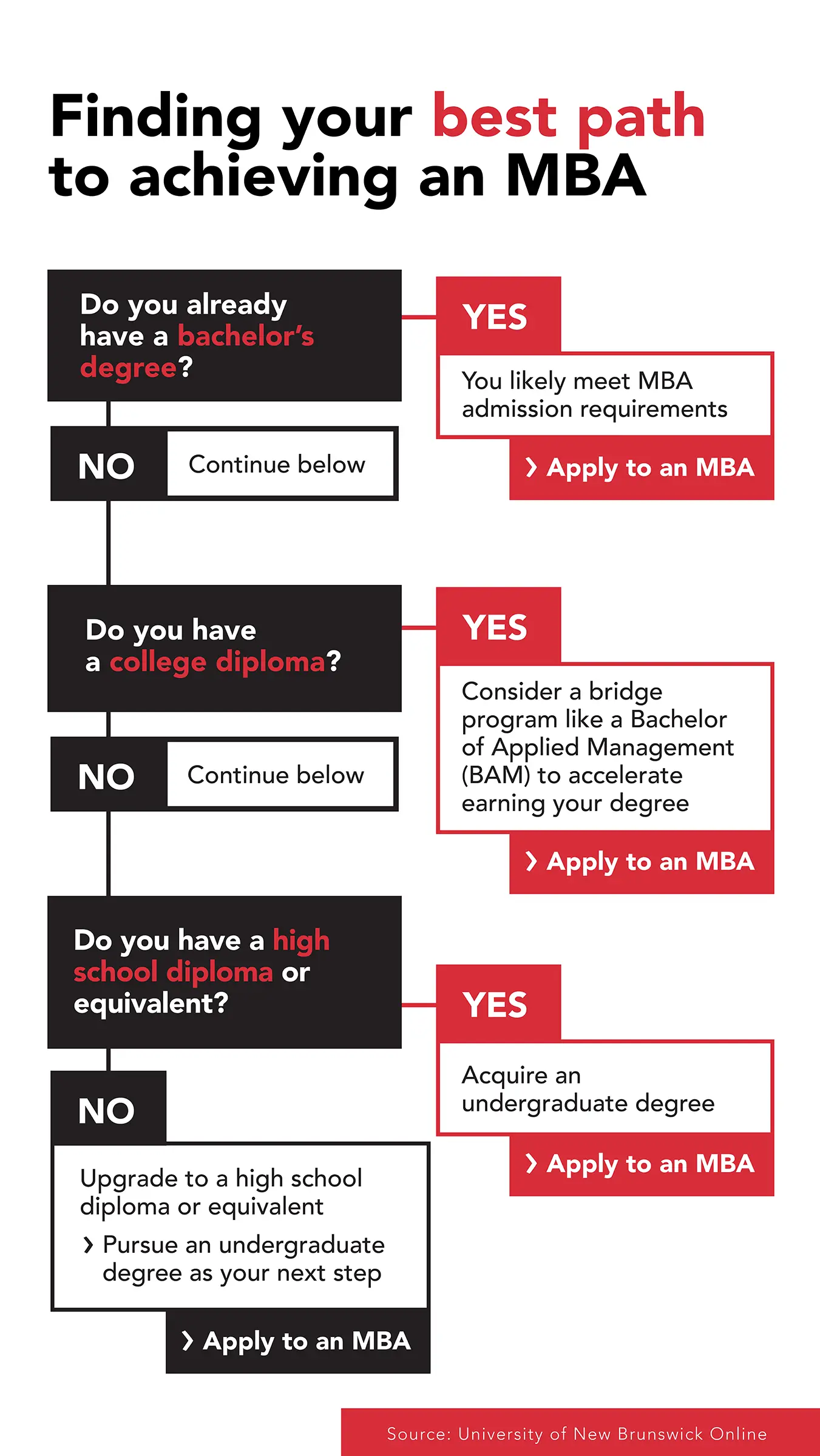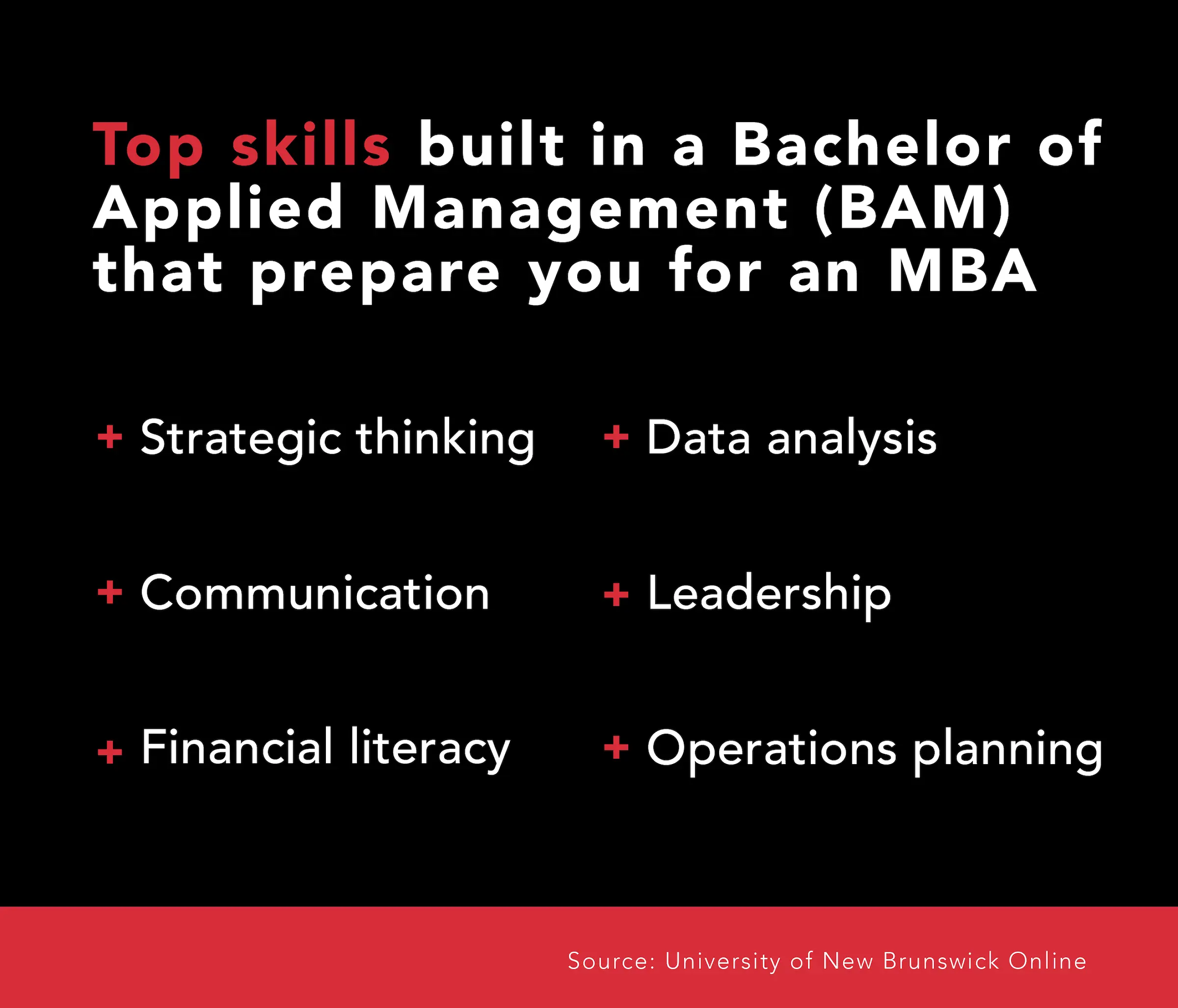You’re building a career, gaining experience and stepping into bigger responsibilities. However, without a formal undergraduate degree, you might be wondering if the next step, an MBA, is even on the table.
It’s a common question. While many MBA programs do expect applicants to hold a bachelor’s degree, that requirement isn’t always as rigid as it seems. In fact, some schools offer flexible pathways or second-entry programs designed to help you bridge the gap, especially if you already have a college diploma or years of work experience.
Below, we'll explore what an MBA is, how admission typically works in Canada and what your options are if you don’t hold a traditional bachelor's degree.
What is a Master of Business Administration (MBA), and why is it such an in-demand degree?
A Master of Business Administration (MBA) is a graduate degree designed to help professionals build the skills, confidence and strategic thinking needed to lead teams, manage businesses or launch ventures. Most MBA programs cover a wide spectrum of business skills, including operations, financial management, marketing, business analytics and leadership.
People pursue an MBA for many different reasons. Some want to move up in their current company. Others are making a career pivot or want to launch their own business. In fields like consulting, finance, healthcare, marketing and tech, the MBA is often seen as a valuable step toward executive-level roles.
It also helps professionals expand their networks and increase their earning potential. According to Universities Canada, professionals with a master’s degree earn roughly 21% more than those with only an undergraduate degree, and earn 38% more than Canada's national average income overall.
Do you need a business degree for an MBA in Canada?
While most Canadian MBA programs require an undergraduate degree, it doesn’t need to be in business. Diverse academic backgrounds in engineering, arts, science or health can still meet the requirement.
In fact, a 2023 survey of prospective MBA students by the Graduate Management Admission Council (GMAC) revealed that 55% of respondents had a non-business bachelor's degree.
That said, many programs, particularly executive tracks, recognize that not all applicants follow a linear academic path. Some accept students who have extensive management experience, professional certifications or who complete a designated “bridge” program first.
This is where options like the Bachelor of Applied Management (BAM) come in, helping college diploma holders or mature learners earn a qualifying credential to round out their business education.
Can you get into an MBA without a bachelor’s degree?
It’s uncommon, but not impossible. Some Executive MBA programs (EMBA) offer exceptions to the bachelor’s degree requirement. These programs are typically tailored to senior professionals who have substantial on-the-job learning and a proven record of leadership.
However, it’s important to note that many EMBA programs still prefer at least some form of post-secondary education, such as a college diploma or professional designation.
To be considered for an MBA without an undergraduate degree, prospective MBA students will usually need:
- 10 or more years of progressive professional experience
- A portfolio of leadership roles and business achievements
- High-level certifications such as CPA, CFA or PMP
- A compelling application that demonstrates academic readiness
Even in these cases, programs may require additional testing, probationary admission or completion of foundational coursework.
It’s also important to note that while some competitors may admit students without a degree or work experience, these programs may lack the academic rigour and global credibility that come with AACSB accreditation. Less selective programs may offer easier entry, but they don’t always offer the same return on investment in terms of graduate outcomes, employer recognition or long-term value.
At UNB, both the Online BAM and Online MBA programs are delivered by an AACSB-accredited Faculty of Business, placing them among the top 6% of business schools worldwide. This ensures your education meets a global standard of excellence and prepares you for success in real-world business environments.

How to qualify for an MBA program if you don’t have a bachelor’s degree
If you hold a college diploma, your best move is to pursue a second-entry university degree like a Bachelor of Applied Management (BAM). These programs are designed to help working professionals and diploma holders gain the academic credibility required to apply for graduate programs.
A program like UNB’s Online BAM is tailored for this path. It lets you:
- Earn a 20-course, university-level degree
- Build practical management skills and strategic thinking
- Study online from anywhere in Canada, at your own pace
- Prepare for a smooth transition into an MBA program
The BAM doesn’t just strengthen your academic record. It also builds your business knowledge and gives you the confidence to thrive in future graduate studies.
Why UNB’s Online Bachelor of Applied Management (BAM) is the best path to an MBA
UNB’s Online BAM is one of the few programs in Canada specifically built for college diploma graduates who want to advance their education. It’s a second-entry offering, which means you skip the first two years of a traditional degree and start directly in year three.
This saves you time and money, while still offering:
- A 100% online delivery model designed for busy professionals
- Practical, management-focused courses with real-world application
- Access to an AACSB-accredited Faculty of Business (top 6% globally)
- Flexible part-time or accelerated pacing options
- A direct pathway into UNB’s Online MBA upon completion
Graduates emerge with the foundational knowledge needed to succeed in graduate-level business programs and the confidence to compete for higher-level roles across industries.
In a job market where the need for employees with a bachelor's degree or higher has risen by 170% since 2015, the BAM provides a fast, affordable and flexible solution.

What are the MBA admission requirements at most Canadian universities?
Each business school and program varies slightly depending on the criteria set out by their admissions committee, but in general, Canadian MBA programs look for:
- A four-year bachelor’s degree (or equivalent)
- A competitive GPA (often 3.0 or higher on a 4.0 scale)
- At least two years of full-time professional work experience
- Letters of reference from academic or professional contacts
- A statement of purpose outlining your career goals
- A resume or CV highlighting achievements and business background
- GMAT or GRE scores (some may waive this)
- Proof of English proficiency if it is not your first language
While some requirements may be waived or adjusted based on your background, an undergraduate degree remains a consistent baseline across many business schools.
What are the MBA admission requirements at UNB Online?
UNB’s Online MBA program maintains rigorous but accessible standards for applicants. To qualify, you’ll need:
- A recognized undergraduate degree with a minimum GPA of 3.0
- At least two years of work experience in a relevant field
- A current resume
- Letters of recommendation from academic or professional referees
- A personal statement that outlines your professional goals and why the MBA is right for you
The MBA program is designed to support working professionals with the flexibility of 100% online delivery and a GMAT waiver available for qualified applicants. It also maintains a high standard of academic integrity through its AACSB accreditation.
Should you choose an MBA or an Executive MBA?
Your choice between an MBA and an EMBA depends on your background and goals.
A traditional MBA is best suited for those with an undergraduate degree and a few years of professional experience. It’s ideal if you want to build practical skills, expand your career options or pivot industries.
An EMBA, on the other hand, is usually geared toward seasoned professionals. It assumes a higher baseline of leadership experience and focuses more on strategy, leadership and executive-level problem-solving.
Here’s the trade-off: EMBA programs are usually more expensive and time-intensive. While some are flexible with academic credentials, many still expect an undergraduate degree or an alternative post-secondary qualification.
So if you're without a bachelor's degree, pursuing a BAM first may open more doors, giving you options on both sides.
Start your journey to an MBA today with UNB Online
An MBA can be a powerful tool for career growth, but not having a bachelor’s degree doesn't have to be the end of the road.
The Online Bachelor of Applied Management (BAM) from UNB offers a smart, accessible way to meet MBA admissions criteria, strengthen your business knowledge and move toward leadership with confidence. If you’re ready to invest in your future, this is your opportunity to do it on your terms.
Learn more about UNB’s Online BAM and Online MBA, or apply today, and start building the credentials that will carry your career further.

